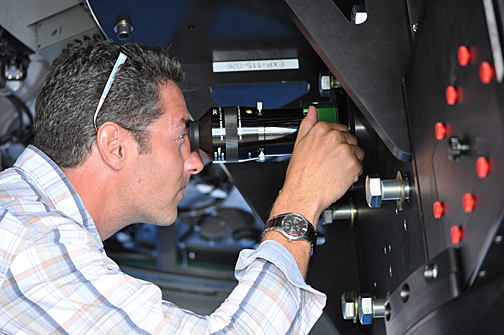
Dr. J.D. Smith, associate professor of astronomy, viewed Venus last month through a commemorative eyepiece during a tour of the Discovery Channel Telescope facility in Happy Jack, Ariz.
Zerbey was part of a delegation of 10 UT faculty, students and administrators who headed out West to sign an agreement making the University a partner in the Discovery Channel Telescope.
UT, Boston University and the University of Maryland have joined a consortium with the Lowell Observatory and the Discovery Channel to conduct scientific research using the 4.3-meter telescope located south of Flagstaff overlooking the Verde Valley. It is the fifth largest telescope in the continental United States and one of the most technologically advanced.
Described by Dr. Michael Cushing, assistant professor of astronomy and director of the Ritter Planetarium, as the “Swiss Army knife” of telescopes, the Discovery Channel Telescope poses tremendous opportunities for UT researchers.

The 4.3-meter Discovery Channel Telescope is located south of Flagstaff in a semi-remote area that overlooks the Verde Valley near Sedona.
“It’s a huge step forward for the group,” said Dr. Karen Bjorkman, dean of the College of Natural Sciences and Mathematics, and Distinguished University Professor of Astronomy. “As astronomers, we typically have to apply for time. We have to compete with other astronomers. With access to the Discovery Channel Telescope as a science partner, we’ll be able to know that we’ll have access to this telescope over a longer period. People can plan long-term science projects that will be much more interesting and much larger in scope than what they’ve been able to do.”
Coupled with the recent installation of a new, state-of-the-art projector in Ritter Planetarium and ongoing research success among astronomy faculty, University leaders felt that the investment in the telescope consortium was a natural fit.
“We’re a modest group with eight faculty in astronomy,” said Dr. J.D. Smith, associate professor of astronomy. “But in many ways, we have been a group that is on the move. We are incredibly accomplished, particularly with space-based astronomy.”
“Sometimes the stars align to create a situation where you have all the elements for greatness, and I think that has happened here,” said Dr. William McMillen, provost and executive vice president for academic affairs.
The Discovery Channel Telescope already has released its first images, and UT faculty hope to begin using the telescope to advance research this spring.
Meanwhile, the Discovery Channel is preparing to debut a documentary about the project; “Scanning the Skies: The Discovery Channel Telescope” will air Sunday, Sept. 9, at 7 p.m.
httpv://www.youtube.com/watch?v=M9o5kvJPPUg&feature=youtu.be